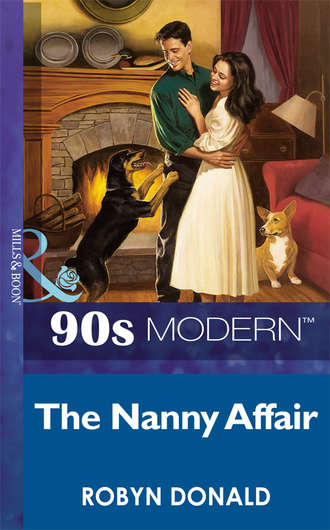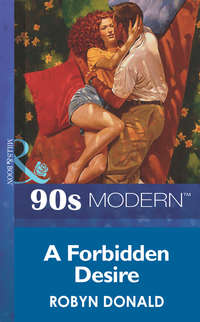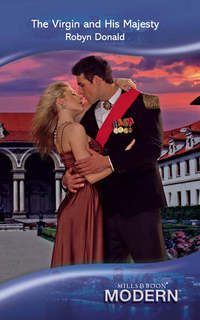
Полная версия
The Nanny Affair
Mercifully, a renewed fusillade of barks from the house dragged her back from that dangerous brink.
Twisting away, she blinked several times at the silver hood of Mrs Firth’s car to clear her sight. ‘I’d better get going,’ she said—how strange that her voice was perfectly steady—‘before Lucky decides to break a window to rescue me.’
It was a stupid thing to say, and to his credit Kane didn’t pick her up on it. Instead he said, ‘One day you must tell me how he managed to acquire a name like that.’
She slid into the car, realising only when she’d finished clicking on the seatbelt that he held the door for her. ‘I’ll do that,’ she said, nodding at a point just over his left shoulder.
‘If you wait, I’ll go ahead and show you the way to the garage.’
A little too sharply she countered, ‘That’s very kind of you, but if you tell me where it is you won’t need to bother.’ She managed to produce a smile. ‘It must be difficult to get lost in Parahai.’
‘Impossible. Turn left at the crossroads. The workshop is on the right about three hundred metres past it.’
‘Thank you.’
Her breath sighed out as he closed the door and stood back to let her drive on.
Accelerating down the road, she thought with real gratitude that she wasn’t likely to see much of him. According to Mrs Firth he had interests in Australia and North America, so he was often out of the country.
Which was just as well, because he didn’t appear to be attacked by the same treacherous weakness that still quickened her pulses. His hard, angular face hadn’t changed, and there’d been no answering glitter in the glacial depths of those eyes. Naturally, because he was in love with another woman. Since all of her friends who had fallen in lust had assured her that it was mutual, a meeting of desires across a crowded room, this had to be a crush rather than lust. She’d get over it.
And it had better happen soon, she thought, noticing that his car was already in her rearview mirror. Apart from anything else, the physical manifestations were embarrassing and extravagant
And scary. She’d never realised she could feel like this—as though the world and all her interests had suddenly condensed to an unbearable focus on one man. Exciting it certainly was, but far from comfortable.
Not to mention the fact that she was much too busy to waste time developing a hopeless crush on someone at least ten years older than she was, and light-years ahead of her in sophistication. Who belonged to another woman.
Setting her jaw, she drove sedately for ten minutes through farms and orchards, finally coming down a steep hill to the village. Parahai was a small town on the edge of a narrow, winding inlet Once a busy coastal shipping port and now a yachting haven, it served a diverse area of farms and stations and orchards. Because there were beaches close by it was a holiday town, so during summer the tree-lined streets were probably frantic.
In spring it was laid back enough to be friendly, and that holiday rush ensured that the shops were of a higher standard than she’d expected in such a small place. Emma liked the ambience, admired the pohutukawa trees shading the main street, and enjoyed the quick smiles of the locals.
She followed Kane’s directions to the workshop and got out, tensing as his car drew up beside her. Leaning into the Volvo, she pulled out her bag and asked sweetly as she straightened, ‘Have you discovered that your warrant is overdue too?’
He got out—all long legs and shoulders, she thought crossly—and surveyed her with tawny eyes iced by mockery. ‘No.’
Quelling the urge to be very rude, Emma headed towards the workshop. He caught her up within two strides.
The owner looked up as they walked in. ‘Hi, Kane,’ he said amiably, ‘I didn’t know you were coming in today.’ But that’s all right, his tone revealed.
Kane introduced him to Emma, who had to suffer the open interest in the man’s eyes as he said, ‘Yep, fine, no problem. She should be done in a couple of hours, no sweat.’
Clearly, having Kane with her made her someone to be reckoned with, Emma decided irritably. In spite of his easygoing attitude, there was no mistaking the mechanic’s respect. She handed over the keys and he got into the Volvo and drove it into the workshop.
Kane said, ‘I’ll drop you off wherever you want to go.’
It wasn’t actually a suggestion. With a small, acid pleasure Emma said, ‘If you don’t mind I’ll walk into town. I’d like to look at the gardens on the way and it’s not far.’
No doubt her smile was as insincere as her excuse, because the dark brows drew together for a second and heavy eyelids masked the topaz glitter of his gaze before he said evenly, ‘Of course. But you should wear a hat. Spring comes early up here and the sun can burn any time of the year.’
His eyes lingered a moment on the fine, pale skin of her face, bringing heat flaring to the surface.
‘I’ll remember that,’ she said primly, and set off down the road. Arrogant oaf!
Well, no, ‘oaf’ was the wrong word. He wore clothes that had been made for him by a very good tailor, and there was nothing provincial about him at all; he possessed a worldliness and self-assurance that was all the more potent for being entirely unconscious.
And beneath it there was strength and something predatory, something untamed and battle-hardened, she thought, walking briskly up the road.
Now where had that idea come from?
From the man himself. He had a warrior’s discipline, a power based on cold, unemotional courage and expertise.
And that, Emma scoffed, ignoring a particularly colourful garden, was pure imagination! He possessed a natural male magnetism that attracted a woman’s interest, and she could tell by his muscles that he worked hard, but, although she was certain he could handle himself in any situation, he wasn’t a superhero. They didn’t exist. She’d simply been overwhelmed by an excess of pure male charisma.
And everyone knows, she thought with a faint, malicious smile, that charisma has nothing to do with character—it’s a fairy godmother’s doting gift, handed to the unworthy as well as the good.
The big green car passed her with almost no sound beyond a little toot that irritated her even more; setting her chin, she strode down the footpath, examining magnolias and camellias and daffodils with a determined interest.
Kane had been right when he’d said spring came early in the north; the daffodils were in full glory, daphne bushes perfumed the air with their sharp, exquisite scent, the poplar-like cherry trees she’d noticed were ablaze with tiny rosy-cerise bells, and freesias and annuals mingled in bright profusion in every flowerbed.
Clearly no gardener in Parahai worried about late frosts.
The walk calmed her, so that by the time Emma got to the village she was ready to enjoy its atmosphere. First she called into the bank, to make sure that everything was under control with her account, and then she spent a very pleasant hour acquainting herself with the stock in both the bookshop and a small boutique that specialised in chic, casual clothes.
Nice, but too expensive, she thought, eyeing a smart pair of capri pants with a matching shirt and waistcoat in the crisp, clear grey that suited her. The move from her flat in Taupo to a unit in Hamilton, a bustling city some distance away, had drained more from her bank balance than she’d budgeted for. As she didn’t start her new job for three weeks, she’d have to be careful with her savings.
She found the local library and organised a temporary membership before choosing a detective novel set in ancient Rome and a big, fat historical novel written by a woman who was both a scholar and a brilliant author. Though Mrs Firth had many books, they were mostly about gardening and cooking; Emma enjoyed them, but wanted a little variety.
After that she sat out a shower in a coffee bar that overlooked a little courtyard, where a fountain spilled a shimmer of water over three graduated cockle shells and more flowers bloomed in pots, mostly big, blowzy pansies in shades of blue and purple and yellow. Smiling over her coffee cup at the antics of the sparrows outside, Emma let her irritation fade.
No doubt Kane Talbot didn’t intend to be so autocratic. He’d probably been born that way, she thought, and grinned at the image of a small baby with that imperious nose and chin bending an entire household to his will.
Finally she went to the supermarket, buying the staples she needed before allowing herself the pleasure of choosing a few mandarins, cushiony and glowing, a dark purplish-green avocado and some smooth, ruby, egg-shaped tamarillos, her favourite fruit, so frost-tender they only survived where winters were mild and short.
Leaving the bags to be called for, she set off for the garage again, enjoying the salt-tanged, sunlit air and the huge white clouds that sailed rapidly across the bright sky.
She was a few minutes early, but the mechanic had finished. Wiping his hands on a piece of cloth, he said, ‘I can’t give you a warrant, Ms Saunders, because she needs a new clutch plate. You must have noticed she was shuddering a bit when you started.’
‘Oh,’ Emma said blankly. ‘Well, yes, but I thought it was just because the car was old.’
‘She’s a dowager, all right, but she’s in great heart and a new clutch plate will make all the difference,’ he said encouragingly.
Emma asked the probable cost, and frowned at his reply. ‘That’s a lot of money,’ she said. ‘I’ll have to—’
And stopped, because he glanced past her as someone joined them.
‘Trouble?’ Kane Talbot asked.
The garage owner explained again, and Kane said calmly, That’s all right. We’ll leave the car here and Emma can contact Mrs Firth when she gets home.’ He switched that hard-edged glance to her. ‘If Mrs Firth agrees to the repairs, ring Joe before five this afternoon and he’ll get the part couriered up from Auckland tonight. That way you’ll have the car back almost as soon as if you told him to go ahead now.’
‘Yep, that’s right,’ the mechanic said cheerfully.
Aware that her reluctance to do this was based entirely on the fact that it was Kane who’d suggested it, Emma nodded. ‘OK,’ she said to the mechanic. ‘I’ll contact you as soon as I’ve rung Mrs Firth.’
‘Fine.’ The mechanic nodded at Kane before going back into the workshop.
Emma stood quite still, battling a chill, empty feeling as though somehow the ground had been neatly cut from under her feet.
‘Have you left parcels somewhere?’ Kane asked.
‘At the supermarket.’
‘Right, we’ll go and get them.’
Because there was nothing else to do she went with him, accepting the unforced politeness that put her into the passenger’s seat. He obviously didn’t care whether she wanted him to extend such courtesies to her—he performed them automatically. After a rapid glance Emma decided that he’d probably never even heard of political correctness or the feminist movement.
She felt, she told herself crisply, sorry for that woman in Australia.
The seats were leather and very comfortable. Emma folded her hands in her lap and looked down at them. The seatbelt fitting snugly across her chest seemed to be blocking her breath. Deliberately she inhaled, but barely had time to fill her lungs before Kane opened the door and got in behind the wheel.
CHAPTER TWO
‘ENJOY your morning?’ Kane asked as he turned the key.
‘Yes, thank you.’
‘It’s a nice little town.’ He changed gear and inclined his dark head to someone who’d tooted and waved from another car. ‘How did that Rottweiler get its name? Lucky is all right for a sheepdog or a Labrador, but it’s no name for a guard dog.’
Emma was halfway through her answer before she remembered that she’d planned to stay stiff and distant all the way home. By then it was too late, so she kept on going in her usual pleasant voice.
‘He was lucky Mrs Firth came to collect Babe from the clinic I worked for in Taupo. Or perhaps he was lucky Babe chased a roaming goat out of Mrs Firth’s garden and hurt her paw. She stayed in the clinic overnight, and while she was there a man brought Lucky in. He’d been given the pup but his wife thought it would grow into a monster that might eat their children, so he dumped it on us. When Mrs Firth came to pick up Babe the pup was in a cage, bawling his head off.’
‘And she couldn’t resist him.’ He sounded amused and a little patronising.
A swift glance from beneath her lashes revealed that he was smiling. No doubt he never did anything on impulse.
Looking straight ahead, Emma said woodenly, ‘When she went over to say hello, Lucky rushed across and pressed his face into her hand as though she’d been sent to rescue him.’
Kane laughed quietly. ‘Did he do that to you too?’
‘Oh, yes, but I didn’t tell Mrs Firth that. He was going to be put down, you see.’
‘Not exactly good pet material,’ he observed. ‘They’re tough dogs, and they need a lot of work to keep them happy.’
‘Corgis might look very sweet, but they’re tough dogs too, and Mrs Firth trained Babe well enough.’ This was stretching the point; although Babe was devoted to her mistress, and more than amiable with Emma, she was inclined to snap at strangers, and she certainly ruled the roost in the house.
‘You can pick a corgi up if it misbehaves,’ Kane said ironically.
Emma shrugged. ‘Rottweilers are good, even-tempered dogs if they’re taught properly. They’re really clever—they remember almost everything. I think Lucky’s playfulness and exuberance comes from his grandmother, who was a boxer. His jumping ability certainly does. He’ll be fine.’
She hoped she sounded convincing.
The car slid into the supermarket car park. Kane Talbot got out and so did she, walking quickly inside to pick up her parcels. Again he caught her up before she’d taken more than a few steps.
It was, she thought a few moments later, rather like being with royalty. He knew everybody; they knew him. He greeted people as they walked through the shop, meeting smiles and interested glances. But he didn’t stop to introduce anyone. And he scooped up her three plastic bags without asking whether she needed any help.
The sort of man who simply took over, Emma thought, replacing a quirk of resentment with resignation. Good in emergencies, but unbearable in everyday life. That poor woman in Australia—after a year of marriage she wouldn’t have a thought to call her own.
Back in the car, groceries safely stowed, he switched on the engine and asked casually, ‘Do you ride?’
After a moment’s pause she said, ‘Yes.’
‘I have a mare that badly needs exercise. I’m too big for her and no one’s been on her for a couple of months.’
‘You don’t know whether I’m any good,’ she said.
When his tawny glance flicked across her hands, the fingers curled. She felt as though she’d been branded.
‘I think you’ll be all right,’ he said with cool, abrasive confidence, ‘but if you sit like a sack of spuds and saw at her mouth I’ll rescind the offer.’
Surprised into a short laugh, she said, ‘All right, I’d like to try her out.’
‘She’s not placid.’
‘Neither am I,’ Emma said dulcetly.
Something glittered beneath the long black lashes. ‘No? You look as sweet and demure as a good child.’
Slowly, with great effort, Emma relaxed her hands until they rested sedately in her lap. She’d like to hit him fair and square in the middle of that flat stomach, right on the solar plexus so that she winded him, so that he doubled up and gasped and had to wipe tears from those brilliant eyes.
Restraining the sudden and most unusual surge of anger, she looked down unseeingly. She’d probably break every knuckle if she tried to punch him, and besides, he didn’t look as though he’d accept an attack with equanimity. She stifled the quick, sly query from some hidden part of her brain about how he’d deal with a woman’s aggression, carefully smoothed her brow and leashed her imagination with a strong will.
He probably didn’t mean to sound patronising—and then she looked up and caught the narrow gleam of gold in his eyes and knew that he damned well did.
She produced a smile. ‘I know,’ she said with a sigh. ‘I look like Snow White. That wretched film’s blighted my life.’
‘You wouldn’t have let the wicked stepmama drive you out into the snow?’
How did—? No, he couldn’t know! Colour seeped back into her suddenly clammy skin. When she’d been sixteen she’d fought her prospective stepmother with the only weapon she’d had, her father’s love, and she’d won. Now, seven years too late, she regretted it bitterly.
Fighting to keep her voice even, she said, ‘No. As for housekeeping for seven miners—never.’
‘And I don’t suppose you’re just hanging about waiting for the prince to ride by on his white horse?’
‘Give her credit,’ she retorted, ‘she was in a coma—she couldn’t actually go out looking for him.’
‘True,’ he said, and ruthlessly dragged the conversation back to the subject. ‘So you don’t intend to be any man’s reward?’
‘If we’re still talking about Snow White,’ she returned, ‘don’t you think that the prince was her reward? She’d put up with a lot, worked hard for years and fought off a couple of murderous attacks before succumbing to treachery, and then along came this nice young man who apparently believed in love at first sight. She deserved a treat, and he was it.’
He laughed. ‘Perhaps you’re right. Interesting—fairy stories read as feminist fables.’
‘Nothing as intellectual and rigorous,’ Emma said firmly. ‘It’s just that I got called Snow White so often that I had to develop some sort of attitude to the wretched thing.’
‘I’ll bet you were a tomboy.’
The arrogant, angular profile showed no emotion at all, but the corner of his mouth tucked up. It irritated her that he could read her so easily, and behind that chagrin flickered fear.
Men, Emma had discovered, didn’t really understand women. Seven years ago her father had refused to believe that his daughter was lying and cheating with one aim only: to smash his relationship with the woman he’d been having an affair with, the woman he planned to marry. Because Emma had never been rude, never thrown down any gauntlet, always been polite, he’d believed her and allowed himself to be manipulated by her feigned bulimia.
Looking back down the years, she shivered with dismay as she recalled how grimly she’d battled with the woman she’d believed to be a greedy, unprincipled interloper. Rage and grief had fuelled her determination. She hadn’t cared that her father had truly loved his mistress; she’d been determined to punish them for being lovers while her mother, made wretched by their affair, had suffered and died.
Punish them Emma had. Her father had sent his lover away, and—completely taken in by her pretence—devoted himself to getting Emma through her illness.
A year later he’d died of a heart attack. Sometimes, when she lay awake in the voiceless night, she wondered whether he’d have lived if she hadn’t taken it on herself to avenge his betrayal of her mother, if she hadn’t in turn betrayed her father by lying and cheating. The irony of her own behaviour was now very clear to her.
Kane Talbot seemed a lot more perceptive than most men. Those amber eyes, lit by a clear ring of gold around the dark centres, saw more than she liked.
More acidly than she’d intended, she replied, ‘Turning into a tomboy is the classic response to looking like Snow White. I climbed the highest trees, rode the toughest horses, broke arms and skinned knees galore, and had to prove myself over and over again.’
‘The onset of adolescence must have been a shock,’ he observed.
‘Isn’t it to everyone?’ Emma asked with offhand insouciance. ‘A friend of mine, a thin, shy redhead, was always the tallest in the class—everyone called her Legs. She got unmercifully teased all through primary school. At fifteen she shot up to almost six feet, developed a face to stun the angels, and is now one of the world’s top models.’
And Emma would bet a considerable sum of money that Kane had never had any problems with growing up—or with anything, unless it was swatting away women. That indefinable thing called star quality had probably been obvious from the moment he’d first smiled in his cradle.
Except that ‘star’ was a lightweight description, and there was nothing lightweight about Kane Talbot. The quality that made him immediately noticeable was based on calm mastery of his strength and dynamic power.
Of course, growing up heir to large amounts of money helped. People respected power and influence.
And even as that last snide comment popped into her brain she discarded it. Whatever situation Kane Talbot had been born into he’d still possess that air of authority and courage. It was innate.
Kane broke into her thoughts with, ‘And do you envy this top model?’
‘Good heavens, no.’ She thought a moment, then added fairly, ‘Well, the money would be nice, but I’d go crazy leaping around like they have to, not to mention the hours it takes to make up their faces and do their hair. Sorrel’s into meditation and poetry, so she just lets it all wash over her while she thinks out her next poem, or communes with the infinite, or whatever you do when you meditate. She’s giving it until she’s thirty, and then she’s going to retire and write the great New Zealand novel, which she’s sure is going to be difficult enough to keep her interested and striving for the rest of her life.’
‘She sounds interesting herself,’ he said.
Emma gave a mental shrug. ‘She is,’ she said sturdily. All men were intrigued by beautiful women; why be surprised—and, yes, disappointed—that he fitted the pattern?
He slowed, and turned into the gateway of Mrs Firth’s house. ‘I can hear the dogs barking from here,’ he said.
‘Babe never used to bark until Lucky arrived,’ Emma told him. ‘She taught him his manners, and he taught her that a dog is supposed to raise the roof whenever a stranger appears.’
‘And is she the leader of the pack?’
‘Well, she’s above him,’ she said, relaxing. ‘And I’m above them both, although I do have to keep reminding them that I’m top dog. Lucky is sure we females need protecting, and Babe thinks I’m a snippety young upstart who needs to be taught a few manners myself.’
Absurdly pleased at his laughter, she waited until he’d stopped to say, ‘I’ll get out here and then we won’t have to open and shut the gate.’
‘All right,’ he said pleasantly. ‘I’ll carry your parcels in.’
Emma sighed silently and got out. She needed fresh air to banish the sound of that low, amused laugh and calm her jittery heartbeat. ‘I’ll let the dogs out,’ she called, and walked smartly up the drive to the back door. Both dogs bounded out, although Babe stayed with Emma. Lucky, however, raced barking down towards the car and the open gate.
‘Sit,’ Kane said in a voice that held no fear and no apprehension of disobedience.
The dog skidded to a halt, then obeyed the repeated command and sat. Looking slightly bewildered, he stared up at Kane, who waited a moment to establish dominance, then held out his hand. Lucky made to rise, was bade sternly to sit again, and obeyed instantly. He sniffed Kane’s long fingers with interest and respect, then gazed up into his face. It was ridiculous, but Emma felt shut out from a purely masculine moment.
‘Stay away from my sheep,’ Kane said sternly.
Lucky’s tail, long because Mrs Firth didn’t approve of docking, swept the ground.
Kane said, ‘How do you release him?’
‘G-o-o-d b-o-y.’
He said the words and Lucky sprang up, eagerly sniffing around the car, getting ready to cock his leg until both Emma and Kane said ‘No’ sharply enough to make him look startled and back off.
‘Two nannies,’ Kane said with an ironic smile. ‘He’ll develop a complex.’
A sudden glow in Emma’s heart shocked her. Instinct warned her that Kane Talbot was not good medicine for inexperienced women. Although Emma enjoyed challenges, some, she knew, were not worth the exhilaration.









